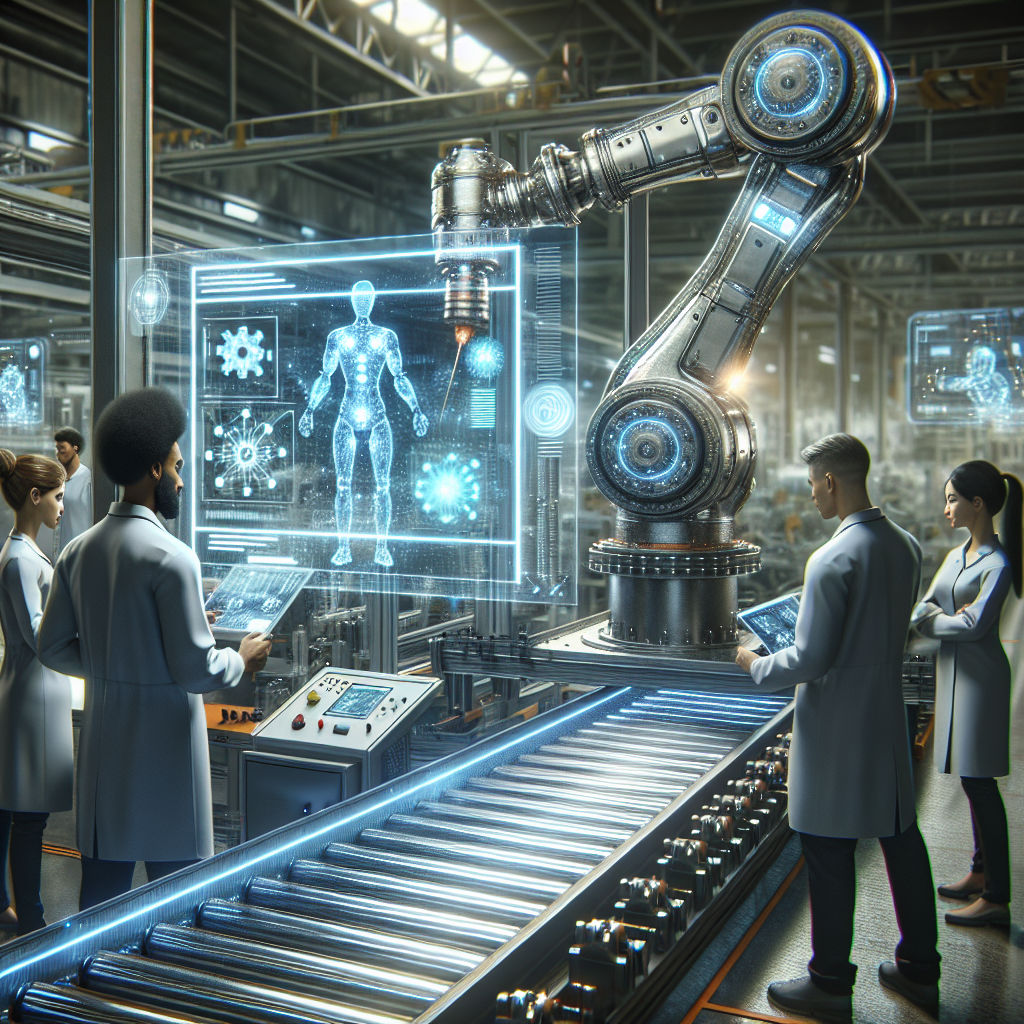In today’s fast-paced manufacturing industry, companies are constantly looking for ways to streamline their processes and increase efficiency. One of the most promising technologies to emerge in recent years is artificial intelligence (AI). By harnessing the power of AI, manufacturers can optimize their operations, reduce costs, and improve product quality. In this article, we will explore how AI is being used to revolutionize manufacturing processes and answer some common questions about this exciting technology.
AI in Manufacturing: A Game-Changer
AI has the potential to revolutionize the manufacturing industry in a number of ways. One of the key benefits of AI is its ability to analyze vast amounts of data in real-time, allowing manufacturers to make more informed decisions and react quickly to changing conditions. For example, AI-powered predictive maintenance systems can monitor equipment performance and detect potential issues before they occur, reducing downtime and maintenance costs.
AI can also be used to optimize production schedules and resource allocation. By analyzing factors such as machine availability, order deadlines, and material availability, AI algorithms can generate optimized production plans that minimize lead times and maximize efficiency. This can help manufacturers meet customer demand more effectively and reduce inventory costs.
Another area where AI is making a big impact is quality control. AI-powered systems can analyze images, sensor data, and other types of data to detect defects and anomalies in real-time. This can help manufacturers identify quality issues early in the production process and take corrective action before defective products are shipped to customers.
Overall, AI has the potential to transform manufacturing processes by improving efficiency, reducing costs, and enhancing product quality. As more manufacturers adopt AI technologies, we can expect to see even greater gains in productivity and competitiveness.
Common Questions About AI in Manufacturing
Q: What types of AI technologies are being used in manufacturing?
A: There are a variety of AI technologies being used in manufacturing, including machine learning, computer vision, natural language processing, and robotics. Machine learning algorithms are used to analyze data and make predictions, while computer vision systems can analyze images and videos to detect defects and anomalies. Natural language processing is used to analyze text data, such as customer feedback or maintenance logs. Robotics technologies, such as autonomous guided vehicles (AGVs) and robotic arms, are also being used to automate tasks and improve efficiency.
Q: How can AI help manufacturers improve quality control?
A: AI can help manufacturers improve quality control by analyzing data from sensors, cameras, and other sources to detect defects and anomalies in real-time. For example, computer vision systems can analyze images of products to detect defects such as scratches, dents, or misalignments. Machine learning algorithms can also be used to analyze sensor data to detect abnormalities in equipment performance. By detecting quality issues early in the production process, manufacturers can take corrective action and prevent defective products from reaching customers.
Q: How can AI help manufacturers optimize production schedules?
A: AI can help manufacturers optimize production schedules by analyzing factors such as machine availability, order deadlines, and material availability to generate optimized production plans. By considering these factors in real-time, AI algorithms can generate schedules that minimize lead times, reduce inventory costs, and maximize efficiency. This can help manufacturers meet customer demand more effectively and improve overall operational performance.
Q: What are the benefits of using AI in manufacturing?
A: There are many benefits to using AI in manufacturing, including improved efficiency, reduced costs, and enhanced product quality. By harnessing the power of AI, manufacturers can optimize their processes, automate repetitive tasks, and make more informed decisions. AI can also help manufacturers detect quality issues early in the production process, reducing the risk of defective products reaching customers. Overall, AI can help manufacturers stay competitive in today’s fast-paced manufacturing industry.
Q: What are some challenges of implementing AI in manufacturing?
A: While the benefits of AI in manufacturing are significant, there are also some challenges to consider when implementing AI technologies. One challenge is the cost of implementing AI systems, which can be significant depending on the complexity of the technology and the size of the manufacturing operation. Another challenge is the need for skilled personnel to develop and maintain AI systems. Manufacturers may need to invest in training or hire new employees with AI expertise to successfully implement AI technologies.
Q: What are some examples of successful AI implementations in manufacturing?
A: There are many examples of successful AI implementations in manufacturing. For example, General Electric uses AI-powered predictive maintenance systems to monitor the performance of its industrial equipment and detect potential issues before they occur. BMW uses computer vision systems to inspect car bodies for defects, reducing the risk of defects reaching customers. Amazon uses robotics technologies, such as AGVs, to automate tasks in its fulfillment centers and improve efficiency. Overall, AI is being used in a variety of ways to optimize manufacturing processes and improve operational performance.
Conclusion
AI is revolutionizing the manufacturing industry by improving efficiency, reducing costs, and enhancing product quality. By harnessing the power of AI technologies such as machine learning, computer vision, and robotics, manufacturers can optimize their processes, automate tasks, and make more informed decisions. As more manufacturers adopt AI technologies, we can expect to see even greater gains in productivity and competitiveness. If you are a manufacturer looking to stay ahead of the competition, consider implementing AI technologies in your operations. With the right strategy and expertise, AI can help you unlock new opportunities for growth and success in today’s fast-paced manufacturing landscape.

